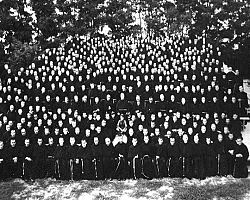October feasts meaningful to Militia Immaculata
Friday, Oct. 18, 2024

Courtesy photo
+ Enlarge
The Niepokalanów monastery community in Poland, founded by St. Maximilian Kolbe, is shown in the 1930s.
Donna Masek
During this month of October, the liturgical calendar celebrates an abundance of holy souls and dates of importance to St. Maximilian Kolbe and the Militia of the Immaculata movement. The feast day of St. Therese of Lisieux is on Oct. 1; we then recognize our guardian angels on Oct. 2. The feast day of the founder of the Franciscan Order to which St. Maximilian Kolbe belonged, St. Francis of Assisi, follows on Oct. 4 and the MI’s 107th anniversary is celebrated on Oct. 16. Amidst the abundance of these grace-filled days, the spirit of St. Therese may highlight the spiritual friendship that St. Maximilian Kolbe and this Doctor of the Church, St. Therese, shared within the Mystical Body of Christ.
Born in 1894, St. Maximilian had a tremendous devotion to St. Therese of Lisieux, (1873-1897), also known as the Little Flower. At the time of his ordination in 1918, St. Therese had not yet been canonized. Thus, he made a spiritual pact with her in the early years of his priesthood. He asked her to intercede for his vocation and Militia of the Immaculata, and he would pray daily for her canonization. Both prayers were answered. St. Maximilian Kolbe celebrated his first Mass at his newly constructed friary, Niepokalanów, which would become the largest friary in the world, on Nov. 12, 1927, and St. Therese was canonized by Pope Pius XI in 1925, just 28 years after her death.
Although a cloistered Carmelite nun, St. Therese was declared the Universal Patroness of the Missions in 1927. Pope Francis reiterated this fact in his General Audience on June 7, 2023: “Therese was a ‘spiritual sister’ to several missionaries: she accompanied them from her monastery through her letters, through her prayers, and by offering continuous sacrifices for them.”
Her intercessory prayers surely continued to assist St. Maximilian Kolbe in his extensive missionary endeavors. Traveling throughout Europe, the Orient and India, he took care of his responsibilities within his Franciscan Order and in the ever-expanding Militia of the Immaculata. True to the MI Consecration Prayer, his life exemplified that which we are all called to do: extend as far as possible the blessed Kingdom of the Most Sacred Heart of Jesus.
St. Maximilian and St. Therese were inseparably linked in their spirituality of victimhood and self-sacrifice. After his ordination on April 28, 1918, Kolbe did not return immediately to Poland but remained in Rome to complete his studies. One of his first Christmas Masses in 1918 was celebrated at the Basilica of Sant’ Anastasia in Rome for this intention: For love onto victimhood.
St. Therese also considered herself to be a little victim for the merciful love of God in a prayer that she composed in 1895: “In order that my life may be one act of perfect love, I offer myself as a victim of holocaust to thy merciful love.”
During the month of November, the Catholic Church will celebrate All Saints Day and All Souls Day. May the Communion of Saints, exemplified in the lives of St. Maximilian Kolbe and St. Therese of Lisieux, the Little Flower, continue to inspire us all.
Donna Masek is a Father Kolbe Volunteer of the Immaculata and a member of the Militia of the Immaculata National Council. She serves both its English and Spanish communities in the Diocese of Salt Lake City. For information, contact Masek at miutah.stmary@gmail.com.
For questions, comments or to report inaccuracies on the website, please CLICK HERE.
© Copyright 2025 The Diocese of Salt Lake City. All rights reserved.
© Copyright 2025 The Diocese of Salt Lake City. All rights reserved.

Stay Connected With Us